Mental Health Acute Care Report: A Case Study on Patient Mr. A
VerifiedAdded on 2022/12/23
|8
|2965
|20
Report
AI Summary
This report provides a detailed analysis of a mental health acute care case study, focusing on Mr. A, a patient with a history of diabetes, memory impairment, and depression. The report delves into Mr. A's medical background, including his challenges with blood glucose levels, sleep patterns, and emotional well-being. It explores the psychosocial aspects of his care, emphasizing the importance of a supportive environment, counseling, and social connections. The report outlines the priorities for care, such as managing depression, addressing sleep issues, and providing emotional support. It discusses nursing interventions, including assessments, planning, and implementing care strategies to address his physical and mental health needs. The report also covers biological treatments, such as medications and electroconvulsive therapy, and provides a critical review of the care experience, highlighting the need for a holistic approach that considers both the patient's physical and emotional well-being. The conclusion emphasizes the importance of a collaborative approach involving the patient, family, and healthcare professionals to improve Mr. A's condition and quality of life.
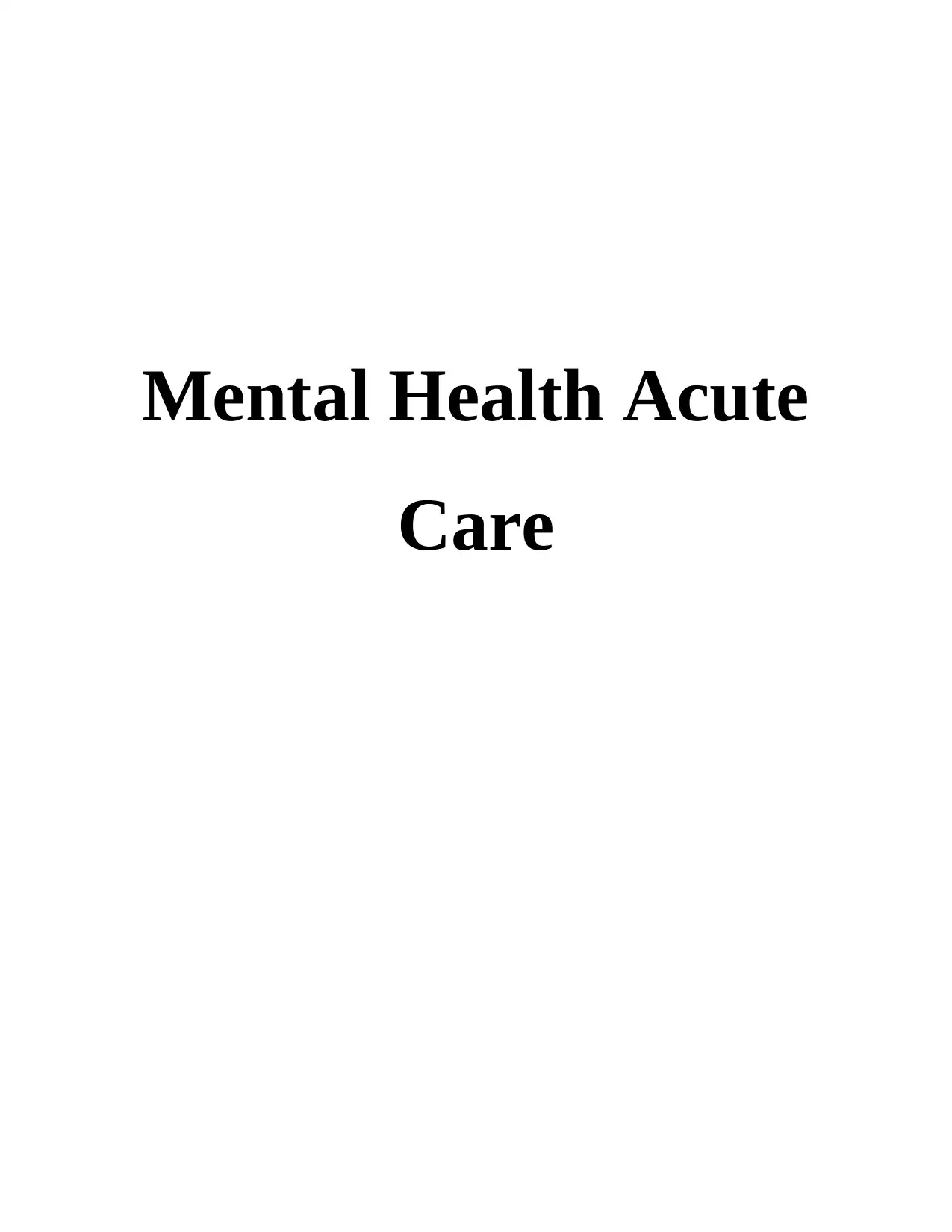
Mental Health Acute
Care
Care
Paraphrase This Document
Need a fresh take? Get an instant paraphrase of this document with our AI Paraphraser
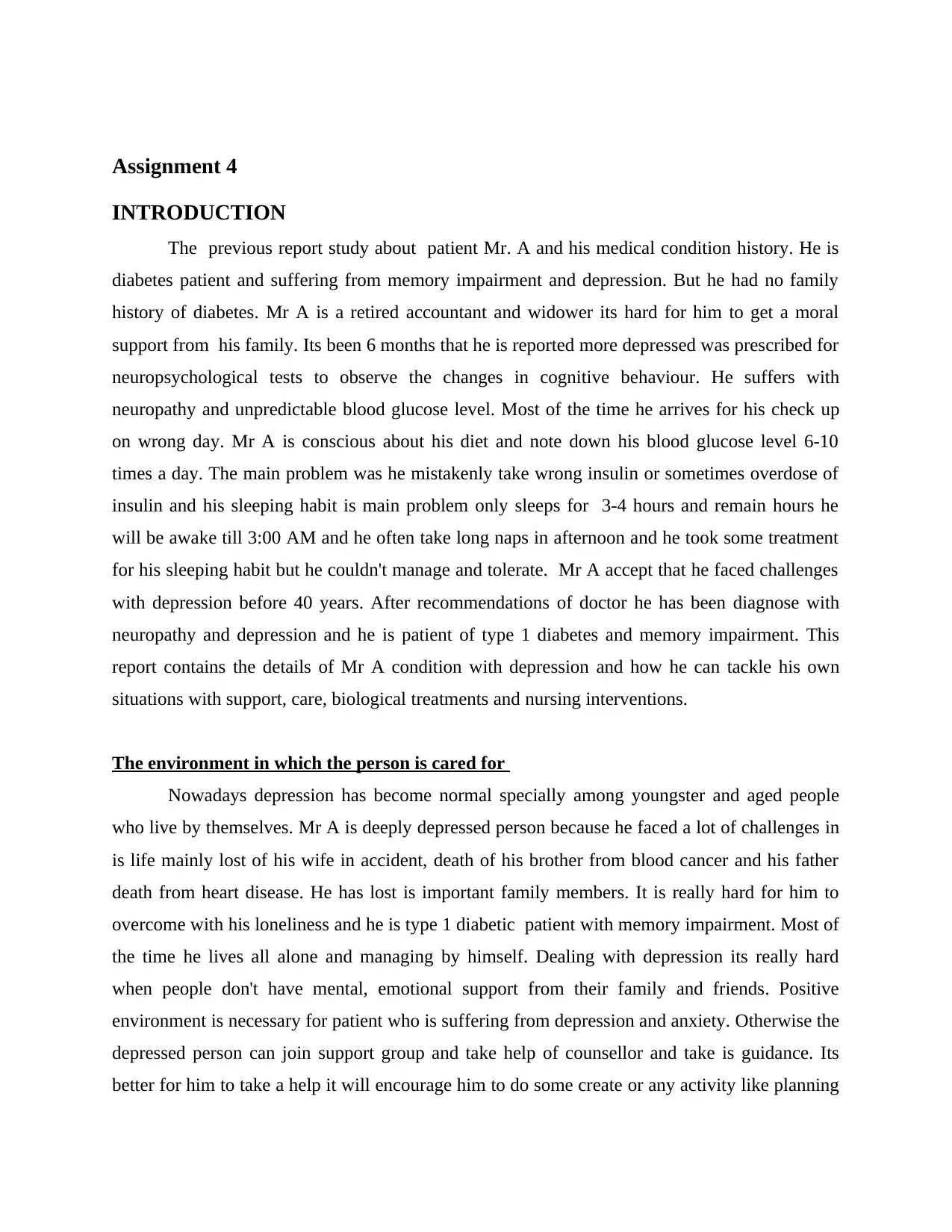
Assignment 4
INTRODUCTION
The previous report study about patient Mr. A and his medical condition history. He is
diabetes patient and suffering from memory impairment and depression. But he had no family
history of diabetes. Mr A is a retired accountant and widower its hard for him to get a moral
support from his family. Its been 6 months that he is reported more depressed was prescribed for
neuropsychological tests to observe the changes in cognitive behaviour. He suffers with
neuropathy and unpredictable blood glucose level. Most of the time he arrives for his check up
on wrong day. Mr A is conscious about his diet and note down his blood glucose level 6-10
times a day. The main problem was he mistakenly take wrong insulin or sometimes overdose of
insulin and his sleeping habit is main problem only sleeps for 3-4 hours and remain hours he
will be awake till 3:00 AM and he often take long naps in afternoon and he took some treatment
for his sleeping habit but he couldn't manage and tolerate. Mr A accept that he faced challenges
with depression before 40 years. After recommendations of doctor he has been diagnose with
neuropathy and depression and he is patient of type 1 diabetes and memory impairment. This
report contains the details of Mr A condition with depression and how he can tackle his own
situations with support, care, biological treatments and nursing interventions.
The environment in which the person is cared for
Nowadays depression has become normal specially among youngster and aged people
who live by themselves. Mr A is deeply depressed person because he faced a lot of challenges in
is life mainly lost of his wife in accident, death of his brother from blood cancer and his father
death from heart disease. He has lost is important family members. It is really hard for him to
overcome with his loneliness and he is type 1 diabetic patient with memory impairment. Most of
the time he lives all alone and managing by himself. Dealing with depression its really hard
when people don't have mental, emotional support from their family and friends. Positive
environment is necessary for patient who is suffering from depression and anxiety. Otherwise the
depressed person can join support group and take help of counsellor and take is guidance. Its
better for him to take a help it will encourage him to do some create or any activity like planning
INTRODUCTION
The previous report study about patient Mr. A and his medical condition history. He is
diabetes patient and suffering from memory impairment and depression. But he had no family
history of diabetes. Mr A is a retired accountant and widower its hard for him to get a moral
support from his family. Its been 6 months that he is reported more depressed was prescribed for
neuropsychological tests to observe the changes in cognitive behaviour. He suffers with
neuropathy and unpredictable blood glucose level. Most of the time he arrives for his check up
on wrong day. Mr A is conscious about his diet and note down his blood glucose level 6-10
times a day. The main problem was he mistakenly take wrong insulin or sometimes overdose of
insulin and his sleeping habit is main problem only sleeps for 3-4 hours and remain hours he
will be awake till 3:00 AM and he often take long naps in afternoon and he took some treatment
for his sleeping habit but he couldn't manage and tolerate. Mr A accept that he faced challenges
with depression before 40 years. After recommendations of doctor he has been diagnose with
neuropathy and depression and he is patient of type 1 diabetes and memory impairment. This
report contains the details of Mr A condition with depression and how he can tackle his own
situations with support, care, biological treatments and nursing interventions.
The environment in which the person is cared for
Nowadays depression has become normal specially among youngster and aged people
who live by themselves. Mr A is deeply depressed person because he faced a lot of challenges in
is life mainly lost of his wife in accident, death of his brother from blood cancer and his father
death from heart disease. He has lost is important family members. It is really hard for him to
overcome with his loneliness and he is type 1 diabetic patient with memory impairment. Most of
the time he lives all alone and managing by himself. Dealing with depression its really hard
when people don't have mental, emotional support from their family and friends. Positive
environment is necessary for patient who is suffering from depression and anxiety. Otherwise the
depressed person can join support group and take help of counsellor and take is guidance. Its
better for him to take a help it will encourage him to do some create or any activity like planning
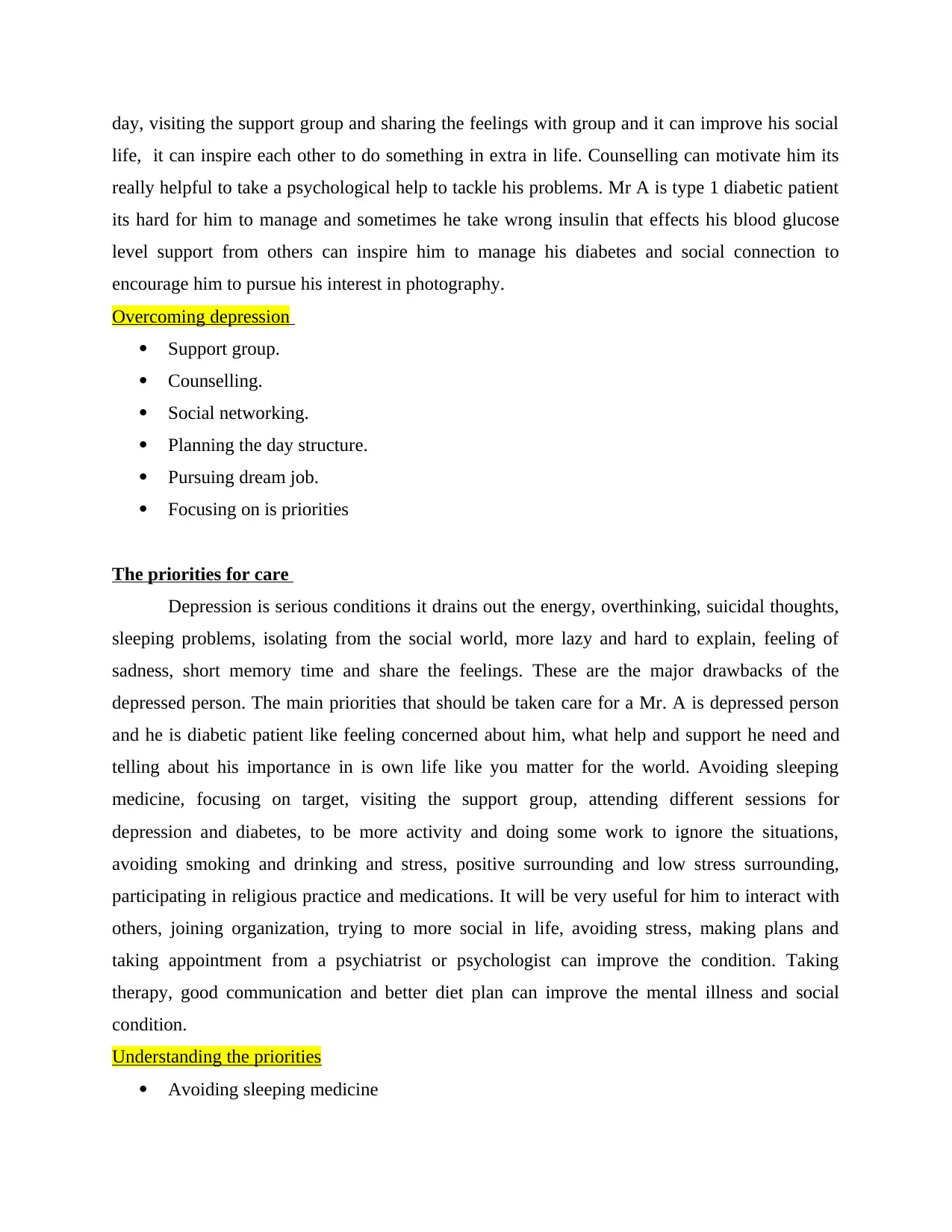
day, visiting the support group and sharing the feelings with group and it can improve his social
life, it can inspire each other to do something in extra in life. Counselling can motivate him its
really helpful to take a psychological help to tackle his problems. Mr A is type 1 diabetic patient
its hard for him to manage and sometimes he take wrong insulin that effects his blood glucose
level support from others can inspire him to manage his diabetes and social connection to
encourage him to pursue his interest in photography.
Overcoming depression
Support group.
Counselling.
Social networking.
Planning the day structure.
Pursuing dream job.
Focusing on is priorities
The priorities for care
Depression is serious conditions it drains out the energy, overthinking, suicidal thoughts,
sleeping problems, isolating from the social world, more lazy and hard to explain, feeling of
sadness, short memory time and share the feelings. These are the major drawbacks of the
depressed person. The main priorities that should be taken care for a Mr. A is depressed person
and he is diabetic patient like feeling concerned about him, what help and support he need and
telling about his importance in is own life like you matter for the world. Avoiding sleeping
medicine, focusing on target, visiting the support group, attending different sessions for
depression and diabetes, to be more activity and doing some work to ignore the situations,
avoiding smoking and drinking and stress, positive surrounding and low stress surrounding,
participating in religious practice and medications. It will be very useful for him to interact with
others, joining organization, trying to more social in life, avoiding stress, making plans and
taking appointment from a psychiatrist or psychologist can improve the condition. Taking
therapy, good communication and better diet plan can improve the mental illness and social
condition.
Understanding the priorities
Avoiding sleeping medicine
life, it can inspire each other to do something in extra in life. Counselling can motivate him its
really helpful to take a psychological help to tackle his problems. Mr A is type 1 diabetic patient
its hard for him to manage and sometimes he take wrong insulin that effects his blood glucose
level support from others can inspire him to manage his diabetes and social connection to
encourage him to pursue his interest in photography.
Overcoming depression
Support group.
Counselling.
Social networking.
Planning the day structure.
Pursuing dream job.
Focusing on is priorities
The priorities for care
Depression is serious conditions it drains out the energy, overthinking, suicidal thoughts,
sleeping problems, isolating from the social world, more lazy and hard to explain, feeling of
sadness, short memory time and share the feelings. These are the major drawbacks of the
depressed person. The main priorities that should be taken care for a Mr. A is depressed person
and he is diabetic patient like feeling concerned about him, what help and support he need and
telling about his importance in is own life like you matter for the world. Avoiding sleeping
medicine, focusing on target, visiting the support group, attending different sessions for
depression and diabetes, to be more activity and doing some work to ignore the situations,
avoiding smoking and drinking and stress, positive surrounding and low stress surrounding,
participating in religious practice and medications. It will be very useful for him to interact with
others, joining organization, trying to more social in life, avoiding stress, making plans and
taking appointment from a psychiatrist or psychologist can improve the condition. Taking
therapy, good communication and better diet plan can improve the mental illness and social
condition.
Understanding the priorities
Avoiding sleeping medicine
⊘ This is a preview!⊘
Do you want full access?
Subscribe today to unlock all pages.

Trusted by 1+ million students worldwide
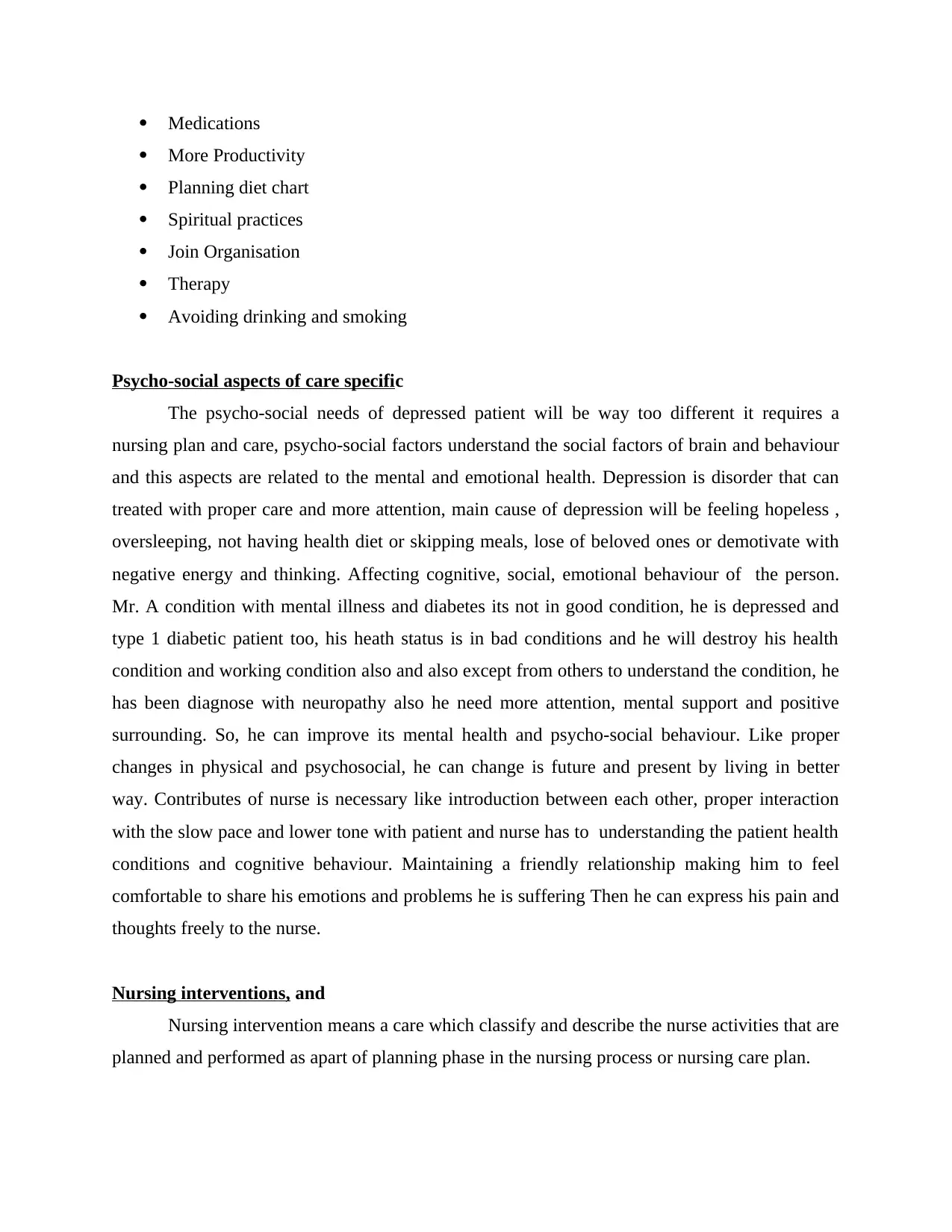
Medications
More Productivity
Planning diet chart
Spiritual practices
Join Organisation
Therapy
Avoiding drinking and smoking
Psycho-social aspects of care specific
The psycho-social needs of depressed patient will be way too different it requires a
nursing plan and care, psycho-social factors understand the social factors of brain and behaviour
and this aspects are related to the mental and emotional health. Depression is disorder that can
treated with proper care and more attention, main cause of depression will be feeling hopeless ,
oversleeping, not having health diet or skipping meals, lose of beloved ones or demotivate with
negative energy and thinking. Affecting cognitive, social, emotional behaviour of the person.
Mr. A condition with mental illness and diabetes its not in good condition, he is depressed and
type 1 diabetic patient too, his heath status is in bad conditions and he will destroy his health
condition and working condition also and also except from others to understand the condition, he
has been diagnose with neuropathy also he need more attention, mental support and positive
surrounding. So, he can improve its mental health and psycho-social behaviour. Like proper
changes in physical and psychosocial, he can change is future and present by living in better
way. Contributes of nurse is necessary like introduction between each other, proper interaction
with the slow pace and lower tone with patient and nurse has to understanding the patient health
conditions and cognitive behaviour. Maintaining a friendly relationship making him to feel
comfortable to share his emotions and problems he is suffering Then he can express his pain and
thoughts freely to the nurse.
Nursing interventions, and
Nursing intervention means a care which classify and describe the nurse activities that are
planned and performed as apart of planning phase in the nursing process or nursing care plan.
More Productivity
Planning diet chart
Spiritual practices
Join Organisation
Therapy
Avoiding drinking and smoking
Psycho-social aspects of care specific
The psycho-social needs of depressed patient will be way too different it requires a
nursing plan and care, psycho-social factors understand the social factors of brain and behaviour
and this aspects are related to the mental and emotional health. Depression is disorder that can
treated with proper care and more attention, main cause of depression will be feeling hopeless ,
oversleeping, not having health diet or skipping meals, lose of beloved ones or demotivate with
negative energy and thinking. Affecting cognitive, social, emotional behaviour of the person.
Mr. A condition with mental illness and diabetes its not in good condition, he is depressed and
type 1 diabetic patient too, his heath status is in bad conditions and he will destroy his health
condition and working condition also and also except from others to understand the condition, he
has been diagnose with neuropathy also he need more attention, mental support and positive
surrounding. So, he can improve its mental health and psycho-social behaviour. Like proper
changes in physical and psychosocial, he can change is future and present by living in better
way. Contributes of nurse is necessary like introduction between each other, proper interaction
with the slow pace and lower tone with patient and nurse has to understanding the patient health
conditions and cognitive behaviour. Maintaining a friendly relationship making him to feel
comfortable to share his emotions and problems he is suffering Then he can express his pain and
thoughts freely to the nurse.
Nursing interventions, and
Nursing intervention means a care which classify and describe the nurse activities that are
planned and performed as apart of planning phase in the nursing process or nursing care plan.
Paraphrase This Document
Need a fresh take? Get an instant paraphrase of this document with our AI Paraphraser
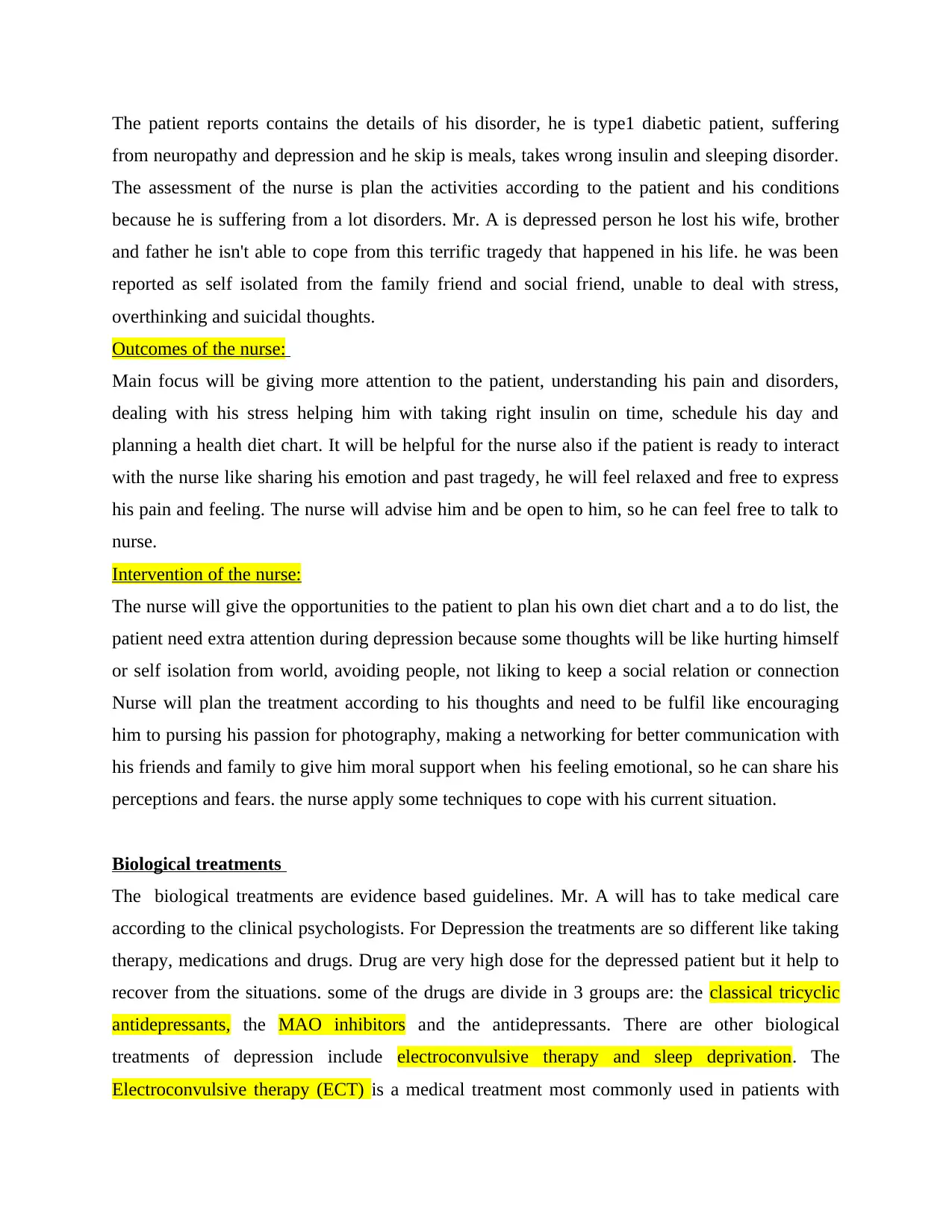
The patient reports contains the details of his disorder, he is type1 diabetic patient, suffering
from neuropathy and depression and he skip is meals, takes wrong insulin and sleeping disorder.
The assessment of the nurse is plan the activities according to the patient and his conditions
because he is suffering from a lot disorders. Mr. A is depressed person he lost his wife, brother
and father he isn't able to cope from this terrific tragedy that happened in his life. he was been
reported as self isolated from the family friend and social friend, unable to deal with stress,
overthinking and suicidal thoughts.
Outcomes of the nurse:
Main focus will be giving more attention to the patient, understanding his pain and disorders,
dealing with his stress helping him with taking right insulin on time, schedule his day and
planning a health diet chart. It will be helpful for the nurse also if the patient is ready to interact
with the nurse like sharing his emotion and past tragedy, he will feel relaxed and free to express
his pain and feeling. The nurse will advise him and be open to him, so he can feel free to talk to
nurse.
Intervention of the nurse:
The nurse will give the opportunities to the patient to plan his own diet chart and a to do list, the
patient need extra attention during depression because some thoughts will be like hurting himself
or self isolation from world, avoiding people, not liking to keep a social relation or connection
Nurse will plan the treatment according to his thoughts and need to be fulfil like encouraging
him to pursing his passion for photography, making a networking for better communication with
his friends and family to give him moral support when his feeling emotional, so he can share his
perceptions and fears. the nurse apply some techniques to cope with his current situation.
Biological treatments
The biological treatments are evidence based guidelines. Mr. A will has to take medical care
according to the clinical psychologists. For Depression the treatments are so different like taking
therapy, medications and drugs. Drug are very high dose for the depressed patient but it help to
recover from the situations. some of the drugs are divide in 3 groups are: the classical tricyclic
antidepressants, the MAO inhibitors and the antidepressants. There are other biological
treatments of depression include electroconvulsive therapy and sleep deprivation. The
Electroconvulsive therapy (ECT) is a medical treatment most commonly used in patients with
from neuropathy and depression and he skip is meals, takes wrong insulin and sleeping disorder.
The assessment of the nurse is plan the activities according to the patient and his conditions
because he is suffering from a lot disorders. Mr. A is depressed person he lost his wife, brother
and father he isn't able to cope from this terrific tragedy that happened in his life. he was been
reported as self isolated from the family friend and social friend, unable to deal with stress,
overthinking and suicidal thoughts.
Outcomes of the nurse:
Main focus will be giving more attention to the patient, understanding his pain and disorders,
dealing with his stress helping him with taking right insulin on time, schedule his day and
planning a health diet chart. It will be helpful for the nurse also if the patient is ready to interact
with the nurse like sharing his emotion and past tragedy, he will feel relaxed and free to express
his pain and feeling. The nurse will advise him and be open to him, so he can feel free to talk to
nurse.
Intervention of the nurse:
The nurse will give the opportunities to the patient to plan his own diet chart and a to do list, the
patient need extra attention during depression because some thoughts will be like hurting himself
or self isolation from world, avoiding people, not liking to keep a social relation or connection
Nurse will plan the treatment according to his thoughts and need to be fulfil like encouraging
him to pursing his passion for photography, making a networking for better communication with
his friends and family to give him moral support when his feeling emotional, so he can share his
perceptions and fears. the nurse apply some techniques to cope with his current situation.
Biological treatments
The biological treatments are evidence based guidelines. Mr. A will has to take medical care
according to the clinical psychologists. For Depression the treatments are so different like taking
therapy, medications and drugs. Drug are very high dose for the depressed patient but it help to
recover from the situations. some of the drugs are divide in 3 groups are: the classical tricyclic
antidepressants, the MAO inhibitors and the antidepressants. There are other biological
treatments of depression include electroconvulsive therapy and sleep deprivation. The
Electroconvulsive therapy (ECT) is a medical treatment most commonly used in patients with
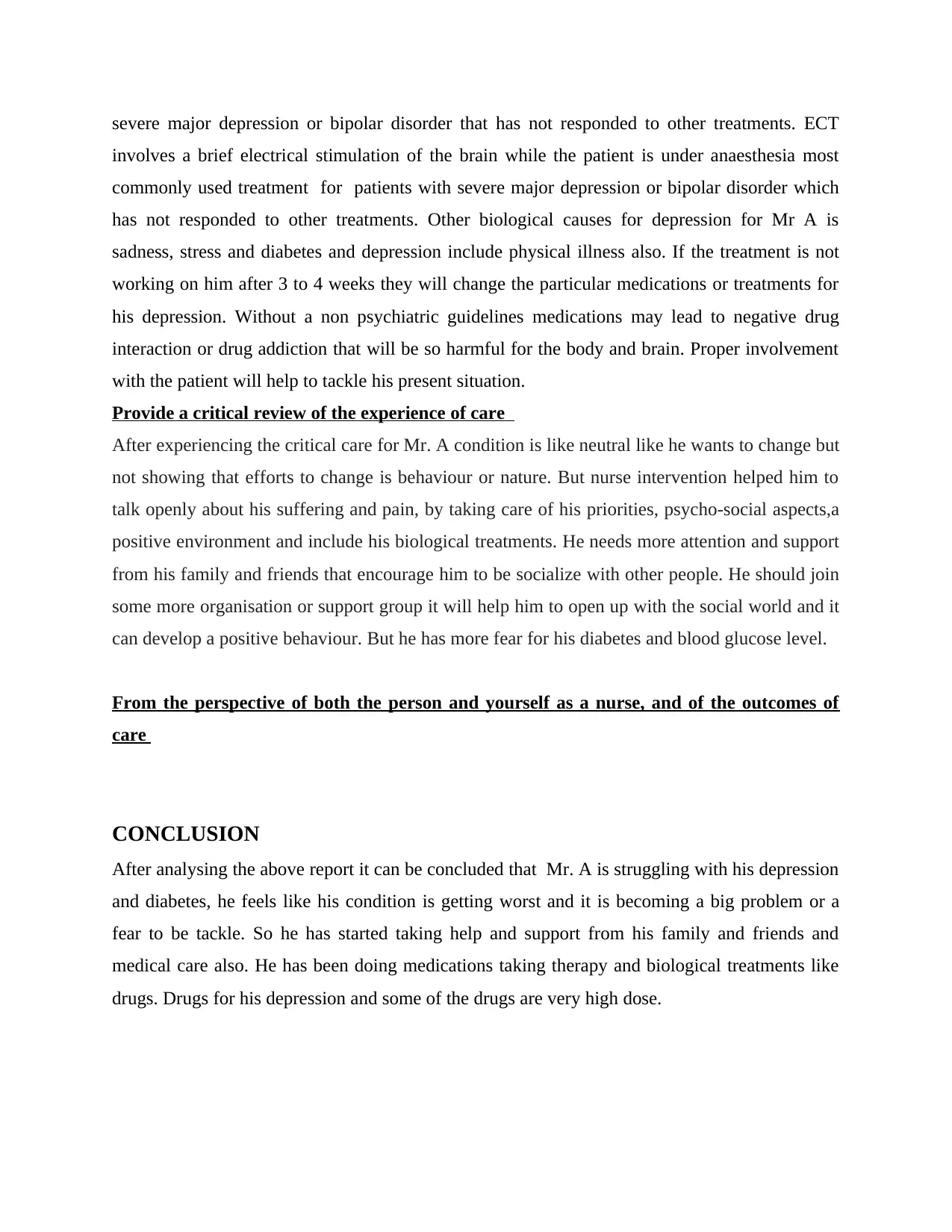
severe major depression or bipolar disorder that has not responded to other treatments. ECT
involves a brief electrical stimulation of the brain while the patient is under anaesthesia most
commonly used treatment for patients with severe major depression or bipolar disorder which
has not responded to other treatments. Other biological causes for depression for Mr A is
sadness, stress and diabetes and depression include physical illness also. If the treatment is not
working on him after 3 to 4 weeks they will change the particular medications or treatments for
his depression. Without a non psychiatric guidelines medications may lead to negative drug
interaction or drug addiction that will be so harmful for the body and brain. Proper involvement
with the patient will help to tackle his present situation.
Provide a critical review of the experience of care
After experiencing the critical care for Mr. A condition is like neutral like he wants to change but
not showing that efforts to change is behaviour or nature. But nurse intervention helped him to
talk openly about his suffering and pain, by taking care of his priorities, psycho-social aspects,a
positive environment and include his biological treatments. He needs more attention and support
from his family and friends that encourage him to be socialize with other people. He should join
some more organisation or support group it will help him to open up with the social world and it
can develop a positive behaviour. But he has more fear for his diabetes and blood glucose level.
From the perspective of both the person and yourself as a nurse, and of the outcomes of
care
CONCLUSION
After analysing the above report it can be concluded that Mr. A is struggling with his depression
and diabetes, he feels like his condition is getting worst and it is becoming a big problem or a
fear to be tackle. So he has started taking help and support from his family and friends and
medical care also. He has been doing medications taking therapy and biological treatments like
drugs. Drugs for his depression and some of the drugs are very high dose.
involves a brief electrical stimulation of the brain while the patient is under anaesthesia most
commonly used treatment for patients with severe major depression or bipolar disorder which
has not responded to other treatments. Other biological causes for depression for Mr A is
sadness, stress and diabetes and depression include physical illness also. If the treatment is not
working on him after 3 to 4 weeks they will change the particular medications or treatments for
his depression. Without a non psychiatric guidelines medications may lead to negative drug
interaction or drug addiction that will be so harmful for the body and brain. Proper involvement
with the patient will help to tackle his present situation.
Provide a critical review of the experience of care
After experiencing the critical care for Mr. A condition is like neutral like he wants to change but
not showing that efforts to change is behaviour or nature. But nurse intervention helped him to
talk openly about his suffering and pain, by taking care of his priorities, psycho-social aspects,a
positive environment and include his biological treatments. He needs more attention and support
from his family and friends that encourage him to be socialize with other people. He should join
some more organisation or support group it will help him to open up with the social world and it
can develop a positive behaviour. But he has more fear for his diabetes and blood glucose level.
From the perspective of both the person and yourself as a nurse, and of the outcomes of
care
CONCLUSION
After analysing the above report it can be concluded that Mr. A is struggling with his depression
and diabetes, he feels like his condition is getting worst and it is becoming a big problem or a
fear to be tackle. So he has started taking help and support from his family and friends and
medical care also. He has been doing medications taking therapy and biological treatments like
drugs. Drugs for his depression and some of the drugs are very high dose.
⊘ This is a preview!⊘
Do you want full access?
Subscribe today to unlock all pages.

Trusted by 1+ million students worldwide
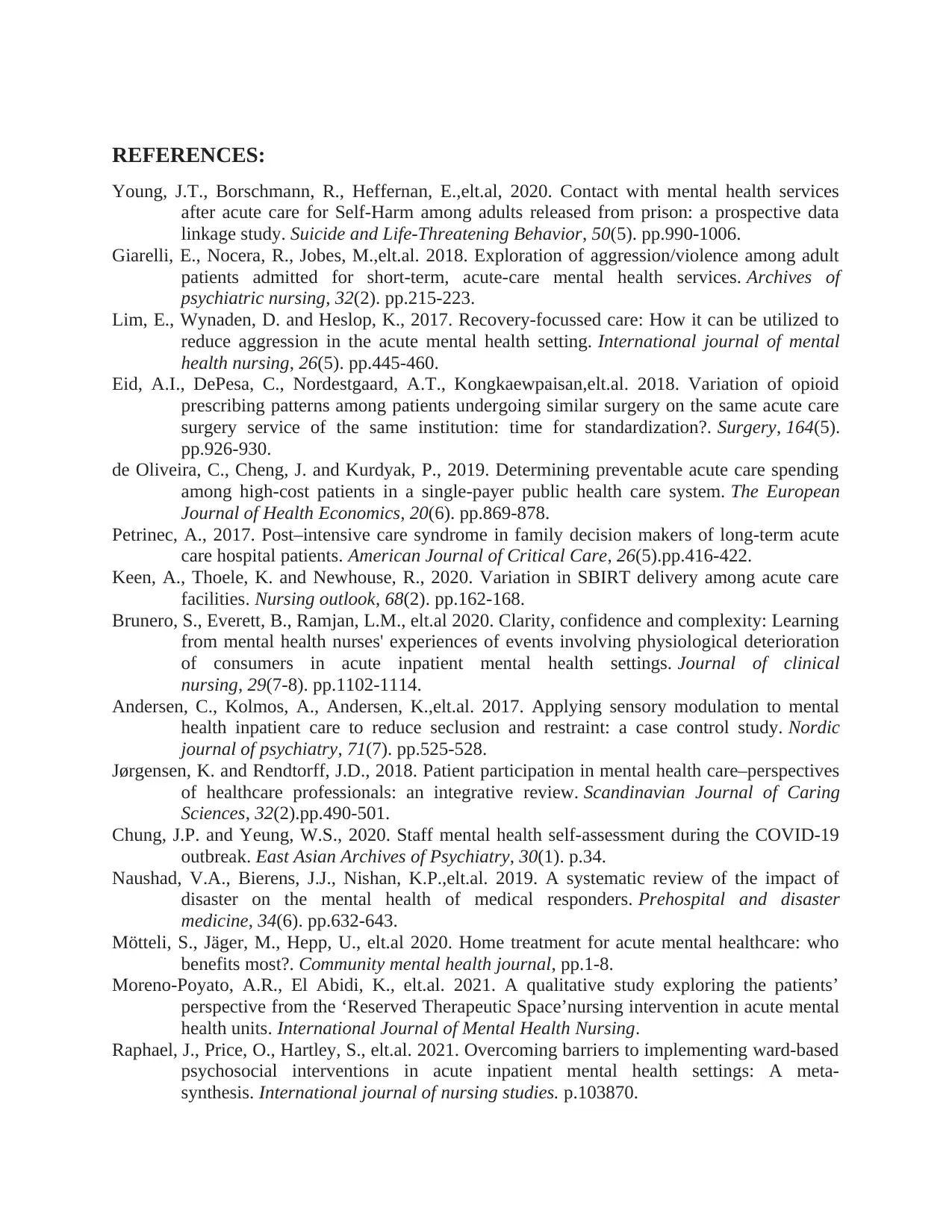
REFERENCES:
Young, J.T., Borschmann, R., Heffernan, E.,elt.al, 2020. Contact with mental health services
after acute care for Self‐Harm among adults released from prison: a prospective data
linkage study. Suicide and Life‐Threatening Behavior, 50(5). pp.990-1006.
Giarelli, E., Nocera, R., Jobes, M.,elt.al. 2018. Exploration of aggression/violence among adult
patients admitted for short-term, acute-care mental health services. Archives of
psychiatric nursing, 32(2). pp.215-223.
Lim, E., Wynaden, D. and Heslop, K., 2017. Recovery‐focussed care: How it can be utilized to
reduce aggression in the acute mental health setting. International journal of mental
health nursing, 26(5). pp.445-460.
Eid, A.I., DePesa, C., Nordestgaard, A.T., Kongkaewpaisan,elt.al. 2018. Variation of opioid
prescribing patterns among patients undergoing similar surgery on the same acute care
surgery service of the same institution: time for standardization?. Surgery, 164(5).
pp.926-930.
de Oliveira, C., Cheng, J. and Kurdyak, P., 2019. Determining preventable acute care spending
among high-cost patients in a single-payer public health care system. The European
Journal of Health Economics, 20(6). pp.869-878.
Petrinec, A., 2017. Post–intensive care syndrome in family decision makers of long-term acute
care hospital patients. American Journal of Critical Care, 26(5).pp.416-422.
Keen, A., Thoele, K. and Newhouse, R., 2020. Variation in SBIRT delivery among acute care
facilities. Nursing outlook, 68(2). pp.162-168.
Brunero, S., Everett, B., Ramjan, L.M., elt.al 2020. Clarity, confidence and complexity: Learning
from mental health nurses' experiences of events involving physiological deterioration
of consumers in acute inpatient mental health settings. Journal of clinical
nursing, 29(7-8). pp.1102-1114.
Andersen, C., Kolmos, A., Andersen, K.,elt.al. 2017. Applying sensory modulation to mental
health inpatient care to reduce seclusion and restraint: a case control study. Nordic
journal of psychiatry, 71(7). pp.525-528.
Jørgensen, K. and Rendtorff, J.D., 2018. Patient participation in mental health care–perspectives
of healthcare professionals: an integrative review. Scandinavian Journal of Caring
Sciences, 32(2).pp.490-501.
Chung, J.P. and Yeung, W.S., 2020. Staff mental health self-assessment during the COVID-19
outbreak. East Asian Archives of Psychiatry, 30(1). p.34.
Naushad, V.A., Bierens, J.J., Nishan, K.P.,elt.al. 2019. A systematic review of the impact of
disaster on the mental health of medical responders. Prehospital and disaster
medicine, 34(6). pp.632-643.
Mötteli, S., Jäger, M., Hepp, U., elt.al 2020. Home treatment for acute mental healthcare: who
benefits most?. Community mental health journal, pp.1-8.
Moreno‐Poyato, A.R., El Abidi, K., elt.al. 2021. A qualitative study exploring the patients’
perspective from the ‘Reserved Therapeutic Space’nursing intervention in acute mental
health units. International Journal of Mental Health Nursing.
Raphael, J., Price, O., Hartley, S., elt.al. 2021. Overcoming barriers to implementing ward-based
psychosocial interventions in acute inpatient mental health settings: A meta-
synthesis. International journal of nursing studies. p.103870.
Young, J.T., Borschmann, R., Heffernan, E.,elt.al, 2020. Contact with mental health services
after acute care for Self‐Harm among adults released from prison: a prospective data
linkage study. Suicide and Life‐Threatening Behavior, 50(5). pp.990-1006.
Giarelli, E., Nocera, R., Jobes, M.,elt.al. 2018. Exploration of aggression/violence among adult
patients admitted for short-term, acute-care mental health services. Archives of
psychiatric nursing, 32(2). pp.215-223.
Lim, E., Wynaden, D. and Heslop, K., 2017. Recovery‐focussed care: How it can be utilized to
reduce aggression in the acute mental health setting. International journal of mental
health nursing, 26(5). pp.445-460.
Eid, A.I., DePesa, C., Nordestgaard, A.T., Kongkaewpaisan,elt.al. 2018. Variation of opioid
prescribing patterns among patients undergoing similar surgery on the same acute care
surgery service of the same institution: time for standardization?. Surgery, 164(5).
pp.926-930.
de Oliveira, C., Cheng, J. and Kurdyak, P., 2019. Determining preventable acute care spending
among high-cost patients in a single-payer public health care system. The European
Journal of Health Economics, 20(6). pp.869-878.
Petrinec, A., 2017. Post–intensive care syndrome in family decision makers of long-term acute
care hospital patients. American Journal of Critical Care, 26(5).pp.416-422.
Keen, A., Thoele, K. and Newhouse, R., 2020. Variation in SBIRT delivery among acute care
facilities. Nursing outlook, 68(2). pp.162-168.
Brunero, S., Everett, B., Ramjan, L.M., elt.al 2020. Clarity, confidence and complexity: Learning
from mental health nurses' experiences of events involving physiological deterioration
of consumers in acute inpatient mental health settings. Journal of clinical
nursing, 29(7-8). pp.1102-1114.
Andersen, C., Kolmos, A., Andersen, K.,elt.al. 2017. Applying sensory modulation to mental
health inpatient care to reduce seclusion and restraint: a case control study. Nordic
journal of psychiatry, 71(7). pp.525-528.
Jørgensen, K. and Rendtorff, J.D., 2018. Patient participation in mental health care–perspectives
of healthcare professionals: an integrative review. Scandinavian Journal of Caring
Sciences, 32(2).pp.490-501.
Chung, J.P. and Yeung, W.S., 2020. Staff mental health self-assessment during the COVID-19
outbreak. East Asian Archives of Psychiatry, 30(1). p.34.
Naushad, V.A., Bierens, J.J., Nishan, K.P.,elt.al. 2019. A systematic review of the impact of
disaster on the mental health of medical responders. Prehospital and disaster
medicine, 34(6). pp.632-643.
Mötteli, S., Jäger, M., Hepp, U., elt.al 2020. Home treatment for acute mental healthcare: who
benefits most?. Community mental health journal, pp.1-8.
Moreno‐Poyato, A.R., El Abidi, K., elt.al. 2021. A qualitative study exploring the patients’
perspective from the ‘Reserved Therapeutic Space’nursing intervention in acute mental
health units. International Journal of Mental Health Nursing.
Raphael, J., Price, O., Hartley, S., elt.al. 2021. Overcoming barriers to implementing ward-based
psychosocial interventions in acute inpatient mental health settings: A meta-
synthesis. International journal of nursing studies. p.103870.
Paraphrase This Document
Need a fresh take? Get an instant paraphrase of this document with our AI Paraphraser
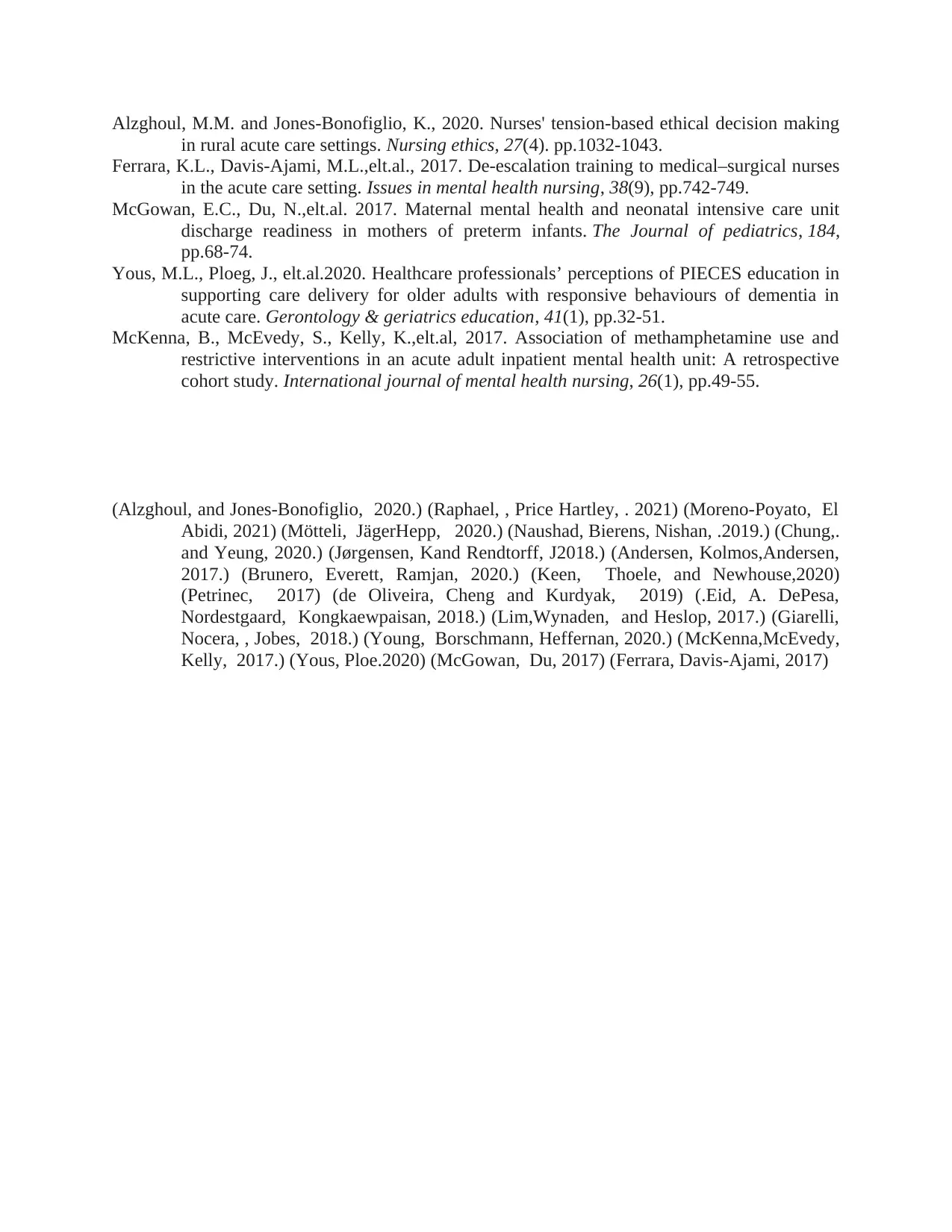
Alzghoul, M.M. and Jones-Bonofiglio, K., 2020. Nurses' tension-based ethical decision making
in rural acute care settings. Nursing ethics, 27(4). pp.1032-1043.
Ferrara, K.L., Davis-Ajami, M.L.,elt.al., 2017. De-escalation training to medical–surgical nurses
in the acute care setting. Issues in mental health nursing, 38(9), pp.742-749.
McGowan, E.C., Du, N.,elt.al. 2017. Maternal mental health and neonatal intensive care unit
discharge readiness in mothers of preterm infants. The Journal of pediatrics, 184,
pp.68-74.
Yous, M.L., Ploeg, J., elt.al.2020. Healthcare professionals’ perceptions of PIECES education in
supporting care delivery for older adults with responsive behaviours of dementia in
acute care. Gerontology & geriatrics education, 41(1), pp.32-51.
McKenna, B., McEvedy, S., Kelly, K.,elt.al, 2017. Association of methamphetamine use and
restrictive interventions in an acute adult inpatient mental health unit: A retrospective
cohort study. International journal of mental health nursing, 26(1), pp.49-55.
(Alzghoul, and Jones-Bonofiglio, 2020.) (Raphael, , Price Hartley, . 2021) (Moreno‐Poyato, El
Abidi, 2021) (Mötteli, JägerHepp, 2020.) (Naushad, Bierens, Nishan, .2019.) (Chung,.
and Yeung, 2020.) (Jørgensen, Kand Rendtorff, J2018.) (Andersen, Kolmos,Andersen,
2017.) (Brunero, Everett, Ramjan, 2020.) (Keen, Thoele, and Newhouse,2020)
(Petrinec, 2017) (de Oliveira, Cheng and Kurdyak, 2019) (.Eid, A. DePesa,
Nordestgaard, Kongkaewpaisan, 2018.) (Lim,Wynaden, and Heslop, 2017.) (Giarelli,
Nocera, , Jobes, 2018.) (Young, Borschmann, Heffernan, 2020.) (McKenna,McEvedy,
Kelly, 2017.) (Yous, Ploe.2020) (McGowan, Du, 2017) (Ferrara, Davis-Ajami, 2017)
in rural acute care settings. Nursing ethics, 27(4). pp.1032-1043.
Ferrara, K.L., Davis-Ajami, M.L.,elt.al., 2017. De-escalation training to medical–surgical nurses
in the acute care setting. Issues in mental health nursing, 38(9), pp.742-749.
McGowan, E.C., Du, N.,elt.al. 2017. Maternal mental health and neonatal intensive care unit
discharge readiness in mothers of preterm infants. The Journal of pediatrics, 184,
pp.68-74.
Yous, M.L., Ploeg, J., elt.al.2020. Healthcare professionals’ perceptions of PIECES education in
supporting care delivery for older adults with responsive behaviours of dementia in
acute care. Gerontology & geriatrics education, 41(1), pp.32-51.
McKenna, B., McEvedy, S., Kelly, K.,elt.al, 2017. Association of methamphetamine use and
restrictive interventions in an acute adult inpatient mental health unit: A retrospective
cohort study. International journal of mental health nursing, 26(1), pp.49-55.
(Alzghoul, and Jones-Bonofiglio, 2020.) (Raphael, , Price Hartley, . 2021) (Moreno‐Poyato, El
Abidi, 2021) (Mötteli, JägerHepp, 2020.) (Naushad, Bierens, Nishan, .2019.) (Chung,.
and Yeung, 2020.) (Jørgensen, Kand Rendtorff, J2018.) (Andersen, Kolmos,Andersen,
2017.) (Brunero, Everett, Ramjan, 2020.) (Keen, Thoele, and Newhouse,2020)
(Petrinec, 2017) (de Oliveira, Cheng and Kurdyak, 2019) (.Eid, A. DePesa,
Nordestgaard, Kongkaewpaisan, 2018.) (Lim,Wynaden, and Heslop, 2017.) (Giarelli,
Nocera, , Jobes, 2018.) (Young, Borschmann, Heffernan, 2020.) (McKenna,McEvedy,
Kelly, 2017.) (Yous, Ploe.2020) (McGowan, Du, 2017) (Ferrara, Davis-Ajami, 2017)
1 out of 8
Related Documents
Your All-in-One AI-Powered Toolkit for Academic Success.
+13062052269
info@desklib.com
Available 24*7 on WhatsApp / Email
![[object Object]](/_next/static/media/star-bottom.7253800d.svg)
Unlock your academic potential
Copyright © 2020–2026 A2Z Services. All Rights Reserved. Developed and managed by ZUCOL.




